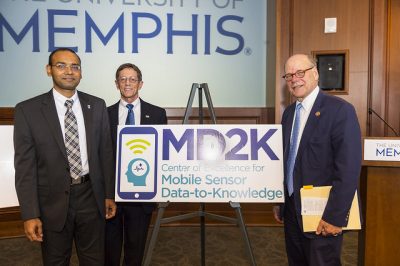$10.8 million grant to develop big data solutions for mobile health sensors
Computer science, engineering, statistical and biomedical researchers from 11 universities will spend the next four years developing innovative tools to make it easier to gather, analyze and interpret health data generated by mobile and wearable sensors. The MD2K team, led by University of Memphis computer scientist Dr. Santosh Kumar, will develop novel Big Data solutions to reliably quantify physical, biological, behavioral, social and environmental factors that contribute to health and disease risk.
Turning the wealth of mobile sensor data available through new and rapidly evolving wearable sensors into reliable and actionable health information is one of the next critical frontiers in realizing the vision of predictive, preventive, personalized, participatory and precision (P5) medicine. MD2K’s team is comprised of leading scientists from Cornell Tech, Georgia Tech, Northwestern, Ohio State, Rice, UCLA, UC San Diego, UC San Francisco, the University of Massachusetts Amherst, the University of Memphis, the University of Michigan, and Open mHealth (a non-profit organization). Together they aim to accelerate progress toward the P5 vision by producing and making widely available open source, extensible and standards-compliant Big Data analytics software for extracting information and actionable knowledge from mobile sensor data.
 Dr. Santosh Kumar, MD2K Center Director; Dr. Andy Meyers, Interim Vice President for Research at the University of Memphis, and U.S. Rep. Steve Cohen at the Oct. 9 announcement of the NIH grant funding the center. |
The team will directly target two complex health conditions with high mortality risk – reducing hospital readmission in congestive heart failure (CHF) patients and preventing relapse in abstinent smokers. The approach and product of MD2K will be applicable to other complex diseases as well, such as asthma, substance abuse and obesity. The Center will make the MD2K tools, software and training materials widely available and will organize workshops and seminars to encourage their use by researchers and clinicians. Dr. J. Gayle Beck, Lillian and Morrie Moss Chair of Excellence in Clinical Psychology at the University of Memphis, will work with Kumar and will direct the Center’s training core.
According to Kumar, “Mobile sensors offer tremendous opportunities for accelerating biomedical discovery and optimizing care delivery. By resolving significant technological and scientific challenges related to the complexities of mobile sensor data, our team aims to lay the scientific foundations for realizing the vision of P5 medicine with mobile sensors and usher in the next generation of healthcare.”
“Being placed at the helm of a multidisciplinary team of renowned scientists vested with leading the nation’s research efforts in this rapidly growing area of discovery is both an honor and a tremendous responsibility,” says University of Memphis President M. David Rudd. “This is testimony to the high level of interdisciplinary and groundbreaking research taking place on our campus in an area of biomedical research that is highly relevant to pressing health concerns in our community, our nation and the world.”
The Mobile Sensor Data-to-Knowledge Center is part of the National Institutes of Health (NIH) Big Data to Knowledge (BD2K) initiative designed to support advances in research, policy and training that are needed for the effective use of Big Data in biomedical research. As part of this initiative, NIH has funded 11 National Centers of Excellence, each representing a multi-investigator, interdisciplinary team working to develop innovative approaches to address a major challenge to the effective use of Big Data and one special data coordination center for the Library of Integrated Network-based Cellular Signatures. Together these centers form a national infrastructure to develop and deploy cutting-edge approaches, methods, software, tools and other resources that will enable biomedical researchers to use Big Data to advance human health. MD2K is the only center focused on mobile health.
NIH announced the grants to the centers, including MD2K, on October 9. The multi-institute awards constitute an initial infestment of nearly $32 million in fiscal 2014 by the BD2K initiative, which is projected to have a total investment of nearly $656 million through 2020, pending available funds.
Find the NIH announcement here, and see a list of the BD2K Centers of Excellence here.

